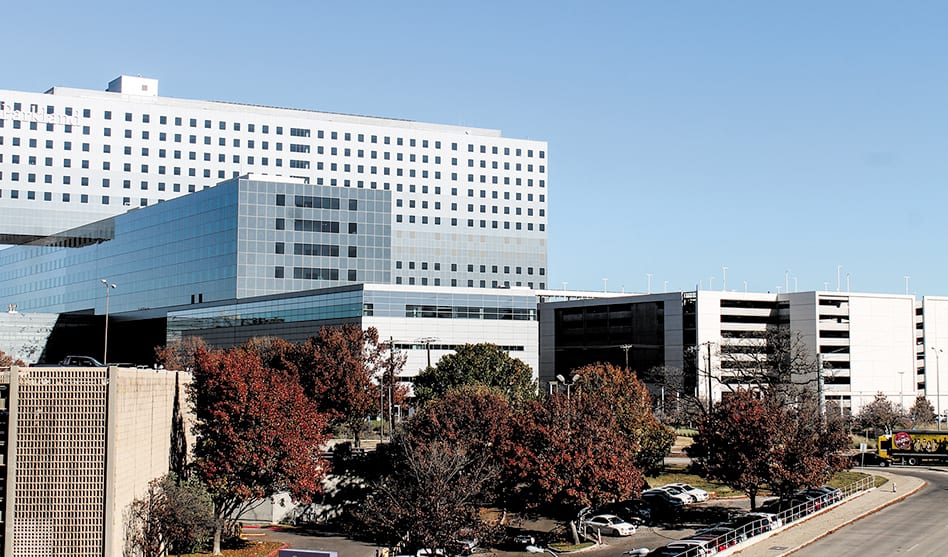Parkland shines as only North Texas hospital with a perfect score, while other area hospitals refuse to participate
DAVID TAFFET | Senior Staff Writer
taffet@dallasvoice.com
If you want to make sure you’re being treated fairly and equally as an employee, patient or visitor in a Dallas hospital, there’s only one choice according to a new survey released by Human Rights Campaign this week. And that one choice is Parkland Hospital.
Not only is Parkland the only hospital in North Texas to receive a 100 on HRC’s latest
Hospital Equality Index, it’s one of only eight in Texas to receive a perfect score.
The rest of UT Southwestern Medical Center, which adjoins Parkland, increased its score from 50 last year to 75 this year. Because it operates under the state-run UT system, which is subject to state law and lawmakers’ whims, some benefits are denied its LGBT employees.
The medical campus received only half its possible points on patient services and support.
The Dallas VA Hospital has shared top honors with Parkland in the past, but fell from a 95 last year to a 55 this year. It lost points for deficiencies in training in LGBT patient care, patient services and support, employee benefits and policies and patient and community involvement. Part of this change could be the difference in federal policies under President Barack Obama’s Department of Veteran’s Affairs and Trump’s.
The HEI is designed to rate inpatient facilities that provide medical and surgical care. Some outpatient facilities are also included. According to HRC, 70 percent of transgender patients and 56 percent of lesbian, gay or bisexual patients have experienced some sort of discrimination in healthcare.
Hospitals were rated in five categories.
The first is non-discrimination in a number of areas. Those include patient non-discrimination, equal visitation for same-sex partners or LGBT parents and employment non-discrimination. Staff training in culturally competent LGBT-centered patient care is also rated, because without training, policies won’t be implemented.
The second category is LGBT patient services and support. Much of this category has to do with HIV testing, offering PrEP and HIV care. Also included is LGBT-focused mental health services, alcohol and substance abuse treatment and family planning or other LGBT-related care.
Transgender support and services include hormone treatment, gynecological care, gender-confirming surgeries or referrals and mental health care. Hospitals are scored on allowing and informing patients of their right to appoint someone, including a same-sex partner, as their medical decision-maker.
Employment policies and benefits is the third category that goes beyond employment-non-discrimination. Trans healthcare benefits as well as equal benefits for same- and opposite-sex spouses are rated.
Next is patient and community engagement. HRC has a number of suggestions for medical institutions but asks that when hospitals are evaluating the needs of the community, LGBT healthcare needs are included in surveys. To achieve this, demographic information about its patients should be kept, and there should be LGBT representation on boards and committees.
Finally, responsible citizenship is scored. Healthcare facilities could have 25 points deducted for activities that would undermine LGBT equality or care. Revoking equality policies, promoting conversion therapy or directing charitable contributions to organizations working to undermine equality are some of the reasons for points to be subtracted.
Other hospitals in Dallas — Baylor, Presbyterian, Methodist and Medical City — once again chose not to participate — some for good reason. No hospitals in Fort Worth or throughout the rest of the DFW area submitted information for inclusion.
However, HRC found some information about the policies of these hospitals on their websites. The information is included on the HRC-HEI website, but it is tricky to find.
Navigate to the map, zoom in on Texas or the location you’re researching, and click on the hospital location.
Baylor, for example, has on its website an LGBT-inclusive patient non-discrimination policy and an equal visitation policy. But the hospital has no employment non-discrimination policies and does no LGBT-sensitivity staff training.
What isn’t included is Baylor’s history of discrimination. Baylor is one of the few organizations found to have violated the Dallas nondiscrimination ordinance. When a same-sex couple tried to join Baylor’s Landry gym as a family, their application was denied.
To settle its suit with the city, Baylor eliminated all family memberships rather than give a discount to one couple.
Presbyterian Hospital lists on its website an equal visitation policy as well as an LGBT-inclusive employment non-discrimination policy. However, it doesn’t have patient nondiscrimination posted.
Medical City offers employment, patient and visitation nondiscrimination policies that are LGBT-inclusive.
On the other hand, Methodist Hospital, which pioneered organ transplantation for people with HIV in Dallas, does not include LGBT patient or visitor non-discrimination policies, and sexual orientation and gender identity are not included in its employment policies, according to HRC’s research.
Children’s Health was not ranked but has been recognized by HRC for its gender clinic, one of only a few for teens in the country.

